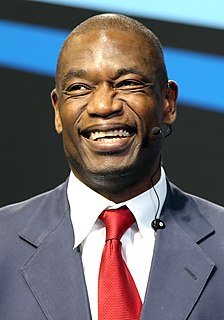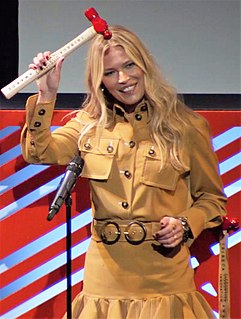A Quote by Dikembe Mutombo
My foundation was created so I can find a way to improve the living conditions of my people in the African continent, not just in Congo.
Related Quotes
I created the Dikembe Mutombo Foundation back in 1997 for the purpose of going in and improving the living conditions of my people on the African continent, especially in the Democratic Republic of Congo where I came from. Out first mission was to go and build a new hospital. Our next mission was to build a school.
I created the Dikembe Mutombo Foundation back in 1997 for the purpose of going in and improving the living conditions of my people on the African continent, especially in the Democratic Republic of Congo where I came from. Our first mission was to go and build a new hospital. Our next mission was to build a school.
The continent is incredibly exciting. When I first went there, it consumed me, and I instantly felt like I wanted to be engaged one way or the other, whether on a philanthropic level or business. I'm lucky to say today that I do both. In terms of African Wildlife Foundation, I started working with them roughly around 2009, on the ambassador level. Then I joined the board and was exposed to deeper issues that the Foundation was combating on the continent.
For centuries, Europeans dominated the African continent. The white man arrogated to himself the right to rule and to be obeyed by the non-white; his mission, he claimed, was to "civilize" Africa. Under this cloak, the Europeans robbed the continent of vast riches and inflicted unimaginable suffering on the African people.
I chose Congo in order to become close to a place that we had turned away from. It isn't present in our imaginations, in the stories we tell each other. Yet it's relevant to our lives and to our worlds, in a practical way. Congo supplies raw materials for the things that we use on a daily basis. We are intimately linked to Congo, economically. We're linked to it through human events that are occurring there, that affect all of us, and yet you don't find narratives of Congo present in our lives.
What moved us was not so much what would it do for South Africa, but there has been a great keenness on the Continent that the location of the Pan African Parliament must add to its credibility. And, so we said, fine, it's a contribution to this process of the democratisation of the African Continent.
China surely must be interested in a more stable, non-antagonistic relationship with the African continent precisely because of its own needs. And therefore would have to say in our own interests, as China, it is necessary that we participate in the process of the development of the African continent.
Africa is one continent, one people, and one nation. The notion that in order to have a nation it is necessary for there to be a common language, a common territory and common culture has failed to stand the test of time or the scrutiny of scientific definition of objective reality... The community of economic life is the major feature within a nation, and it is the economy which holds together the people living in a territory. It is on this basis that the new Africans recognise themselves as potentially one nation, whose dominion is the entire African continent.


































